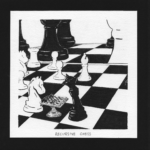What a pleasure it was to be interviewed by Evelyn Lamb and Kevin Knudson for their wonderful podcast series, My Favorite Theorem, available on Apple, Spotify, and any number of other aggregators.
I had a chance to talk about one my most favorite theorems, the fundamental theorem of finite games.
Theorem.(Zermelo 1913) In any two-player finite game of perfect information, one of the players has a winning strategy, or both players have drawing strategies.
Listen to the podcast here: My Favorite Theorem. A transcript is also available.



Wonderful! So clearly explicated. Since I first learned about these concepts, I can’t think about computing in a manner that is non-game theoretic.
I’m currently studying data structure, regular grids from strings (m¹) to (mⁿ), and topologies of non-regular grid n-dimensional database topologies (tensors, etc.) to probabilistic database and potential quantum databases.
So of course I had to start with Gödel databases (prime factorization) which have the useful quality of reversibility, which can be a function of quantum databases. (QTMs are interesting because they have infinite dimensional state spaces.)
It occurs to me that there are a set of games where the tree maps to the boardstate, nimbers as an example. Each nimber is an address, a location in a linear array. But it’s not natively reversible. Unless, perhaps, we use prime factorization to extend the values?
I must consider this more because, if such a set of games exists, I’d like to see how they extend into n-dimensions. The thrust of my paper is that, now we’ve extended data structure into so many robust new models, it might be good to examine how we ultimately represent, and order them as a set of physical states, from the perspective of a cost-function.²
________________________
PS: I’ve already come to see sudoku as a Shannon database via the entropy of any given board state, and plan to see what Von Neumann might have had to say about it. I seem to recall that the math for some of the work in MOLS was similar in spirit to QT, and I’ve been finding that myself. Let me know if you have any thoughts on that or suggestions for further math reading.
Pingback: The Hypergame Paradox – Rising Entropy